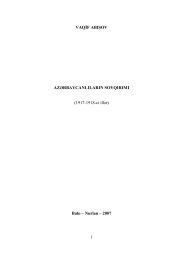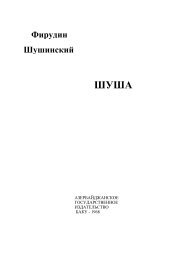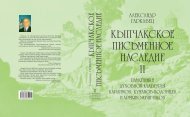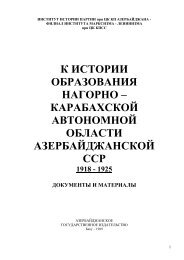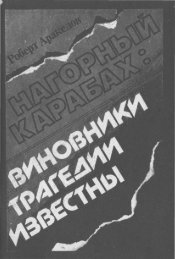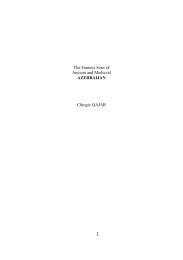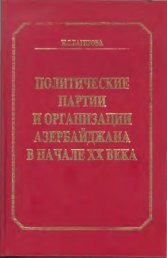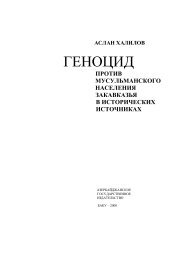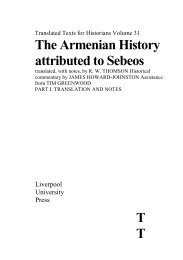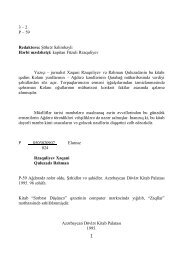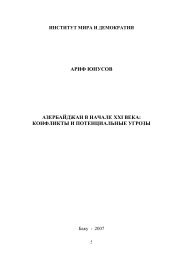ARMENIAN - Erevangala500
ARMENIAN - Erevangala500
ARMENIAN - Erevangala500
Create successful ePaper yourself
Turn your PDF publications into a flip-book with our unique Google optimized e-Paper software.
Minister Henri Franklin-Bouillon rushed to Anatolia, thus<br />
letting it be known that his future negotiating partner was<br />
in Ankara - not in Istanbul where a powerless Ottoman<br />
government was still feigning sovereignty. France thus<br />
accepted the new Turkish "National Pact" and at the same<br />
time made it clear that they considered the dictate o f<br />
Sevres null and void. This was the same France that had<br />
once been the most stubborn and brazen o f all the powers<br />
in goading the Armenians on to terrorism and war. But<br />
back then the goal had been to weaken the Ottoman<br />
Empire. The French quickly changed their tune when it<br />
became apparent that they could not get the better o f the<br />
Turks in this fashion. The "cause o f the Armenians" fell<br />
into oblivion overnight, just like the "Great Greek<br />
Empire", which also self-destructed by overstretching its<br />
opportunities.<br />
In August, 1922, after careful preparation, the Turks<br />
began their assault on the Greek invaders. The Greeks, in<br />
the meantime, had fonned a hedgehog defense in Anatolia<br />
and were putting all their chips on "victory". King<br />
Constantine him self even visited the Anatolian theater of<br />
war on June 13, 1921. In a gesture that was truly pregnant<br />
with symbolic meaning, he set foot on land in the same<br />
spot where the Crusaders had come ashore centuries earlier<br />
(also in vain).<br />
On September 2, 1922, Turkish troops liberated Eskishe-<br />
hir. A week later they were in Manisa, which the Greeks<br />
burned before their departure. They did the same a short<br />
while later to Izmir. The Turks were to be left with nothing<br />
but "scorched earth". Just before Kemal's victoriousforces<br />
marched into Izmir, a devastating fire broke out in the<br />
Armenian quarter o f the city. 25,000 buildings, which<br />
amounted to half o f the entire city, were reduced to ashes.<br />
Fire brigades ran around helplessly, searching in vain for<br />
water supplies. The cisterns were empty, the fire hoses cut,<br />
and the water supplies cut off. This "holokauston" was the<br />
greatest "bumt-offering" ever made in the lands o f the<br />
ancient world. It may well have been the work o f the<br />
Dashnaks. If so, it is second only to the annihilation o f Van<br />
(spring, 1915) on the list o f most appalling Dashnak terrorist<br />
acts ever to plague the world. The arsonists naturally<br />
spread the rumor throughout the world that the Turks had<br />
laid waste to the second largest, second richest, and second<br />
most beautiful city in Anatolia - on the day o f their triumphant<br />
entry!<br />
The world public swallowed this nonsense, just as they<br />
had swallowed the earlier atrocity reports with great satisfaction.<br />
The tale o f the "Terrible Turk" was a sure-fire hit.<br />
On October 11,1922, the victorious Turks and the defeated<br />
Greeks signed the Armistice o f Mudanya. (Mudanya is<br />
a town near Yalova where the Armenian irregulars had<br />
wreaked havoc during the Greek occupation.) This<br />
armistice brought the "Istikal Harbi", the Turkish war o f<br />
independence, to a triumphant close. The government o f<br />
His M ajesty the Sultan - still prisoner o f the Allies in<br />
Istanbul - sent its regards.<br />
The peace negotiations in Lausanne began on November<br />
2 2 ,1 9 2 2 .<br />
Ismet Pasha, the victorious general at Inonu, was leader o f<br />
the Turkish delegation. He now emerged as a talented<br />
diplomat after already having proved him self on the<br />
battlefields o f Anatolia. He succeeded in presenting the<br />
Turkish delegates as negotiating equals. He made it clear that<br />
nationalisms. Consequently, the word "Armenian" is not<br />
even hinted at in the Treaty o f Lausanne.<br />
When Lord Curzon finally brought up the subject o f the<br />
Armenians (apparently because he felt it was his obligation<br />
- they certainly did not interest him anymore, having<br />
served their purpose as useful pawns for the Allies), Ismet<br />
Inonii cut him short:<br />
"As regards the internal political factor, that is to say, the<br />
natural desire o f minorities to free themselves, there is<br />
occasion to observe that the Ottoman Empire, reduced to<br />
essentially Turkish provinces, no longer contains any<br />
minority which can form within it an independent State.<br />
Until the principle o f nationalities receives an equal<br />
application everywhere, separatist movements, designed<br />
to liberate parts o f the Ottoman Empire containing a<br />
considerable number o f non Turkish inhabitants, could<br />
perhaps be justified. The situation is entirely different<br />
today. Just as the Greeks established at Marseilles could<br />
not reasonably think o f creating there an independent<br />
Greek State or o f annexing it to their Mother-Country: in<br />
the same way the Greeks or Armenians in Turkey could<br />
not legitimately desire the same thing in Turkey"<br />
EAAHNIKH ДНМОКРАТІА<br />
ЕАсибіріос; Bc»tCeA



